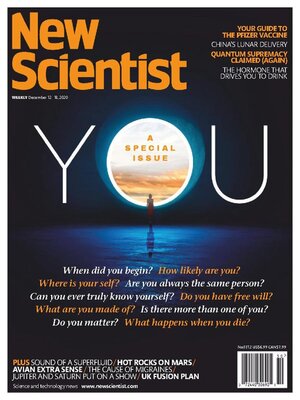New Scientist
magazine ∣ Dec 12 2020 · New Scientist

Sign up to save your library
With an OverDrive account, you can save your favorite libraries for at-a-glance information about availability. Find out more about OverDrive accounts.
Find this title in Libby, the library reading app by OverDrive.



Search for a digital library with this title
Title found at these libraries:
| Loading... |
New Scientist covers the latest developments in science and technology that will impact your world. New Scientist employs and commissions the best writers in their fields from all over the world. Our editorial team provide cutting-edge news, award-winning features and reports, written in concise and clear language that puts discoveries and advances in the context of everyday life today and in the future.
Christmas with New Scientist
A note from the editor
The complexities of you • Studying ourselves isn’t getting any simpler – but it is endlessly fascinating
New Scientist
First shots given in the UK • Older people and health workers get Pfizer/BioNTech vaccine, amid warnings that the pandemic isn’t over yet, reports Michael Le Page
Your guide to the new vaccine • The UK has taken delivery of the first doses of a coronavirus vaccine. How does it work and who will get it when? Graham Lawton reports
What about children?
The Christmas conundrum • Countries across Europe are taking very different approaches to the festive period. Clare Wilson reports
Was England’s second lockdown necessary?
Military robots work best alone • Human operators impede performance of robots being developed for US military
MRI machines get a glimpse at what causes migraines
Voice assistants could guess what someone is typing
Ancient rock art reveals life of Amazon’s earliest people
Up close with other worlds • Samples from the moon and the asteroid Ryugu are returning to Earth
Rocks from Ryugu
Sounds that might be heard in neutron star generated in lab
Brain device lets monkeys ‘see’ without using eyes
Quantum computer that measures light achieves supremacy
UK makes moves to build a nuclear fusion power plant
AI pilot keeps telecoms balloon in the right place
Hot rocks may have given Mars its water
How plastic pollution spreads far and wide
Really brief
Health toll of global warming on the rise
Bird supersense may date back to the dinosaur era
Vaginal microbes hamper HIV drugs
Geology for the future • It is time for geologists to fully embrace what they can do for humanity’s sustainability goals, says Christopher Jackson
No planet B • Party politics during a pandemic Covid-19 continues to split some people along party lines. We are now beginning to work out why, writes Graham Lawton
Your letters
Uniquely you • Understanding human individuality means grappling with genetics and neuroscience. Clare Wilson finds a great new guide to take on the journey
Apocalyptic romance • Superintelligence is a strange but captivating mix of rom-com, sci-fi and action, says Robyn Chowdhury
Don’t miss
The sci-fi column • All too human How would it feel to live in the world imagined by The Preserve, where robots do most things better than people? It is a great thought experiment about an all-too-possible future, says Clare Wilson
HERE’S LOOKING AT YOU • Who are you? Where did you come from, where are you going and what makes you tick? “Know thyself” isn’t an easy maxim to follow, so let New Scientist be your guide on a journey of self-discovery. Over the next 12 pages, we attempt to take you out of yourself and answer the most profound questions about that mysterious, strangely foreign creature in the mirror: you.
THE ‘YOU’ GENES
THE ELEMENTS OF YOU
YOUR EXTENDED SELF
The call of alcohol • Some people get great pleasure from boozing while others can take or leave a drink. We’re beginning to work out why, says Claire Ainsworth
New Scientist’s first virtual all-day event: What is the future of food? • Thousands of people participated in New...






